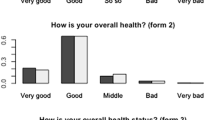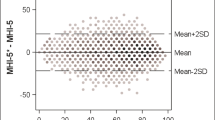Abstract
The statistical benefit of adding open-ended questions to closed questions was evaluated in a survey of 643 participants. The construct of coping was chosen as the measurement domain. Open and closed questions were used to predict mental health a year later. Verbatim responses to open questions were reliably coded (ICC = 0.92), but they did not increase the statistical prediction of measures of mental health beyond the contribution of closed questions. Open-ended questions provided more in-depth information than closed questions, but at the cost of more missing data and less degrees of freedom. The benefit of using open-ended in addition to standard closed questions was thus practically nil, hence questioning the use of qualitative information gathering in surveys for the purpose of statistical prediction.
Similar content being viewed by others
References
Antonovsky A.: The structure and properties of the Sense of coherence scale. Soc. Sci. Med. 36(6), 725–733 (1993)
Antonovsky A.: The structure and properties of the Sense of coherence scale. In: McCubbin, H.I., Thompson, E.A., Thompson, A.I., Fromer, J.E. (eds) Stress, coping, and health in families: sense of coherence and resiliency, pp. 21–40. Sage Publications Inc., Thousand Oaks (1998)
Austenfeld J.L., Stanton A.L.: Coping through emotional approach: A new look at emotion, coping, and health-related outcomes. J. Personal. 72(6), 1335–1363 (2004)
Converse J.M.: Arguments and weak evidence: The open/closed questioning controversy of the 1940s. Pub. Opin. Quart. 48(1B), 267–282 (1984)
Darlington A.S., Dippel D.W., Ribbers G.M., van Balen R., Passchier J., Busschbach J.J.: Coping strategies as determinants of quality of life in stroke patients: A longitudinal study. Cerebrovasc. Dis. 23(5-6), 401–407 (2007)
Eriksson M., Lindstrom B.: Validity of Antonovsky’s sense of coherence scale: a systematic review. J. Epidemiol. Commun. Health 59(6), 460–466 (2005)
Eriksson M., Lindstrom B.: Antonovsky’s sense of coherence scale and the relation with health: a systematic review. J. Epidemiol. Commun. Health 60(5), 376–381 (2006)
Falthzik A.M., Carroll S.J.: Rate of return for closed versus open-ended questions in a mail questionnaire survey of industrial organizations. Psychol. Rep. 29(3), 1121–1122 (1971)
Filazoglu G., Griva K.: Coping and social support and health related quality of life in women with breast cancer in Turkey. Psychol, Health Med. 13(5), 559–573 (2008)
Folkman S., Lazarus R.S.: If it changes it must be a process: Study of emotion and coping during three stages of a college examination. J. Personal. Soc. Psychol. 48(1), 150–170 (1985)
Folkman S., Lazarus R.S.: The relationship between coping and emotion: Implications for theory and research. Soc. Sci. Med. 26(3), 309–317 (1988)
Gil S., Caspi Y.: Personality traits, coping style, and perceived threat as predictors of posttraumatic stress disorder after exposure to a terrorist attack: A prospective study. Psychosom. Med. 68(6), 904–909 (2006)
Greenfield T.K., Nayak M.B., Bond J., Ye Y., Midanik L.T.: Maximum quantity consumed and alcohol-related problems: Assessing the most alcohol drunk with two measures. Alcohol. Clin. Exp. Res. 30(9), 1576–1582 (2006)
Gunthert K.C., Cohen L.H., Armeli S.: The role of neuroticism in daily stress and coping. J. Personal. Soc. Psychol. 77(5), 1087–1100 (1999)
Kessler R.C., Merikangas K.R., Wang P.S.: Prevalence, comorbidity, and service utilization for mood disorders in the United States at the beginning of the twenty-first century. Ann. Rev. Clin. Psychol. 3, 137–158 (2007). doi:10.1146/annurev.clinpsy.3.022806.091444
Lavik N.J., Laake P., Hauff E., Solberg O.: The use of self-reports in psychiatric studies of traumatized refugees: Validation and analysis of HSCL-25. Nordic J. Psychiat. 53(1), 17–20 (1999)
Lazarus R.: Emotion and adaptation. Oxford University Press, New York (1991)
Lien L., Claussen B., Hauff E., Thoresen M., Bjertness E.: Bodily pain and associated mental distress among immigrant adolescents: A population-based cross-sectional study. Eur Child Adolesc. Psychiat. 14(7), 371–375 (2005)
Likert, R.: a technique for the measurement of attitudes. Archives of Psychology 22(140) (1932)
MacLaughlin E.J., Raehl C.L., Treadway A.K., Sterling T.L., Zoller D.P., Bond C.A.: Assessing medication adherence in the elderly: which tools to use in clinical practice? . Drugs & Aging 22, 231–255 (2005)
Miller G.V.F., Travers C.J.: Ethnicity and the experience of work: Job stress and satisfaction of minority ethnic teachers in the UK. Int. Rev. Psychiat. 17(5), 317–327 (2005)
Morris, B.A., Shakespeare-Finch, J., Scott, J.L.: coping processes and dimensions of posttraumatic growth. Austral. J. Disaster Trauma Stud, pp. 1–12 (2007)
Pollard C., Kennedy P.: A longitudinal analysis of emotional impact, coping strategies and post-traumatic psychological growth following spinal cord injury: a 10-year review. Br. J. Health Psychol. 12(3), 347–362 (2007)
Regier D.A., Rae D.S., Narrow W.E., Kaelber C.T., Schatzberg A.F.: Prevalence of anxiety disorders and their comorbidity with mood and addictive disorders. Br. J. Psychiat. 173(34), 24–28 (1998)
Reynolds R.F., Obermeyer C.M., Walker A.M., Guilbert D.: The role of treatment intentions and concerns about side effects in women’s decision to discontinue postmenopausal hormone therapy. Maturitas 43(3), 183–194 (2002)
Rudolph K.D., Dennig M.D., Weisz J.R.: Determinants and consequences of children’s coping in the medical setting: conceptualization, review, and critique. Psychol. Bull. 118(3), 328–357 (1995)
Scheier M.F., Carver C.S.: Optimism, coping, and health: assessment and implications of generalized outcome expectancies. Health Psychol. 4(3), 219–247 (1985)
Scheier M.F., Carver C.S., Bridges M.W.: Distinguishing optimism from neuroticism (and trait anxiety, self-mastery, and self-esteem): a reevaluation of the Life Orientation Test. J. Personal. Soc. Psychol. 67(6), 1063–1078 (1994)
Schuman H., Presser S.: The open and closed question. Am. Sociol. Rev. 44, 692–712 (1979)
Schuman H., Presser S., Ludwig J.: Context effects on survey responses to questions about abortion. Pub. Opin. Quart. 45(2), 216–223 (1981)
Schwarz N.: Self-reports: how the questions shape the answers. Am. Psychol. 54(2), 93–105 (1999)
Schwarz N., Hippler H.-J.: Subsequent questions may influence answers to preceding questions in mail surveys. Pub. Opin. Quart. 59(1), 93–97 (1995)
Skinner E.A.: Coping assessment. In: Ayers, S., Baum, A., McManus, C., Newman, S., Wallston, K., Weinman, J., West , R. (eds) Psychology, Health and Medicine, pp. 245–250. Cambridge University Press, New York (2007)
Skinner E.A., Edge K., Altman J., Sherwood H.: for the structure of coping: a review and critique of category systems for classifying ways of coping. Psychol. Bull. 129(2), 216–269 (2003)
Smith T.W., Pope M.K., Rhodewalt F., Poulton J.L.: Optimism, neuroticism, coping, and symptom reports: an alternative interpretation of the Life Orientation Test. J. Personal. Soc. Psychol. 56(4), 640–648 (1989)
Sørlie T., Sexton H.C.: The factor structure of “The Ways of Coping Questionnaire” and the process of coping in surgical patients. Personal. Individ. Diff. 30(6), 961–975 (2001)
Strand B.H., Dalgard O.S., Tambs K., Rognerud M.: Measuring the mental health status of the Norwegian population: a comparison of the instruments SCL-25, SCL-10, SCL-5 and MHI-5 (SF-36). Nordic J. Psychiat. 57(2), 113–118 (2003)
Strauss A., Corbin J.: Basics of qualitative research. Sage Publications, California (1998)
Streiner D.L., Norman G.R.: Health measurement scales: a practical guide to their development and use, 4th ed. Oxford University Press, New York (2008)
Taylor S.E., Stanton A.L.: Coping resources, coping processes, and mental health. Annu. Rev. Clin. Psychol. 3, 377–401 (2007). doi:10.1146/annurev.clinpsy.3.022806.091520
Werner E.E., Smith R.S.: Overcoming the odds: high risk children from birth to adulthood. Cornell University Press, Ithaca (1992)
Werner E.E., Smith R.S.: Journeys from childhood to midlife: risk, resilience, and recovery. Cornell University Press, Ithaca (2001)
Author information
Authors and Affiliations
Corresponding author
Rights and permissions
About this article
Cite this article
Friborg, O., Rosenvinge, J.H. A comparison of open-ended and closed questions in the prediction of mental health. Qual Quant 47, 1397–1411 (2013). https://doi.org/10.1007/s11135-011-9597-8
Received:
Accepted:
Published:
Issue Date:
DOI: https://doi.org/10.1007/s11135-011-9597-8




